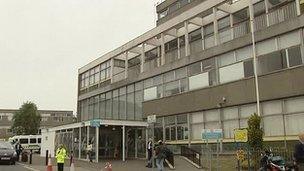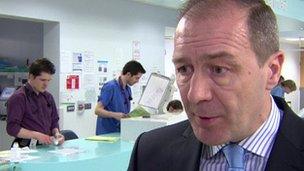Ulster Hospital, Dundonald, postpones 30 operations a week
- Published

Routine operations at the Ulster have been put off until a later date
The Ulster Hospital in Dundonald has postponed about 30 routine operations a week as a result of a shortage of beds.
The move is due to the ongoing pressure on the hospital's accident and emergency department.
A senior manager at the South Eastern Health Trust told the BBC they are short of at least 35 beds.
The trust said it was "necessary to reduce the number of elective inpatients being admitted".
The director of hospital services, Seamus McGoran, said all cancer operations would be dealt with but added that it had been a "really, tough time for staff".
"I want to pay tribute to our staff who have been absolutely wonderful in effectively dealing with a 22% increase in our emergency admissions, in the context of a 9% increase in our beds," he said.

Seamus McGoran said it was a tough time for staff
"It means that more and more patients are backing up in our emergency department and it takes longer to get those patients into a bed.
"Hence we have had a number of patients waiting longer than 12 hours."
In a statement, the trust added: "The patients who will experience a delay in their surgical procedure will not suffer any negative clinical outcome as a result.
"However, the delay may unfortunately impact on the length of time a patient may have to wait for a non urgent inpatient procedure."
Since Belfast City Hospital's A&E closed in 2011, there is now one main emergency department in Belfast, operating from the Royal Victoria Hospital.
That has had a massive impact on other emergency departments in Northern Ireland, in particular, the Ulster Hospital, Dundonald, and Antrim Area Hospital.
In fact, while the focus has been on Belfast and Antrim, staff at the Ulster Hospital have told the BBC they have been fighting their own emergency battle.
'Feel guilty'
One nurse who works in the South Eastern Trust said at times they were sending patients home who should instead be remaining in hospital.
The nurse, who did not want to be identified, said she dreaded the weekend shift.
"At times you do feel guilty but that's the system we work in," she said.
Since Belfast City Hospital's A&E closed, the number of people attending the Ulster Hospital is up by 10,000 a year.
According to Mr McGoran, 40% of those people will be admitted.
While two extra wards were built to cope with the extra demand, Mr McGoran said it was not nearly enough.
Health Minister Edwin Poots acknowledged the pressure that hospitals are under at the moment.
"It is absolutely critical that we do have short waiting times in our emergency departments and that people are not waiting for extended periods of time before they receive care," he said.
He said patients were getting a good service in terms of the quality of care, but added: "In terms of the time that it's taking for patients to receive that care, it's not good enough."
The director of nursing at the Public Health Agency, Mary Hinds, said they must find a long term solution to the problem.
"It is true to say that perhaps the flow of patients to the Ulster and to Belfast, in places, are not what we expected," she said.
"But isn't that the skill of planning? Being able to react to a situation that you are in and trying to manage it to make sure we provide the best service we can for patients and that's exactly what we're doing."
The BBC understands that the health board is considering a so-called zoning programme that will instruct Gp's which A&E department patients should be sent to.
Ms Hinds is to brief the Health and Social Care Board on developments within all emergency departments when it meets on Thursday.
- Published29 February 2012
- Published21 March 2012
- Published23 November 2010